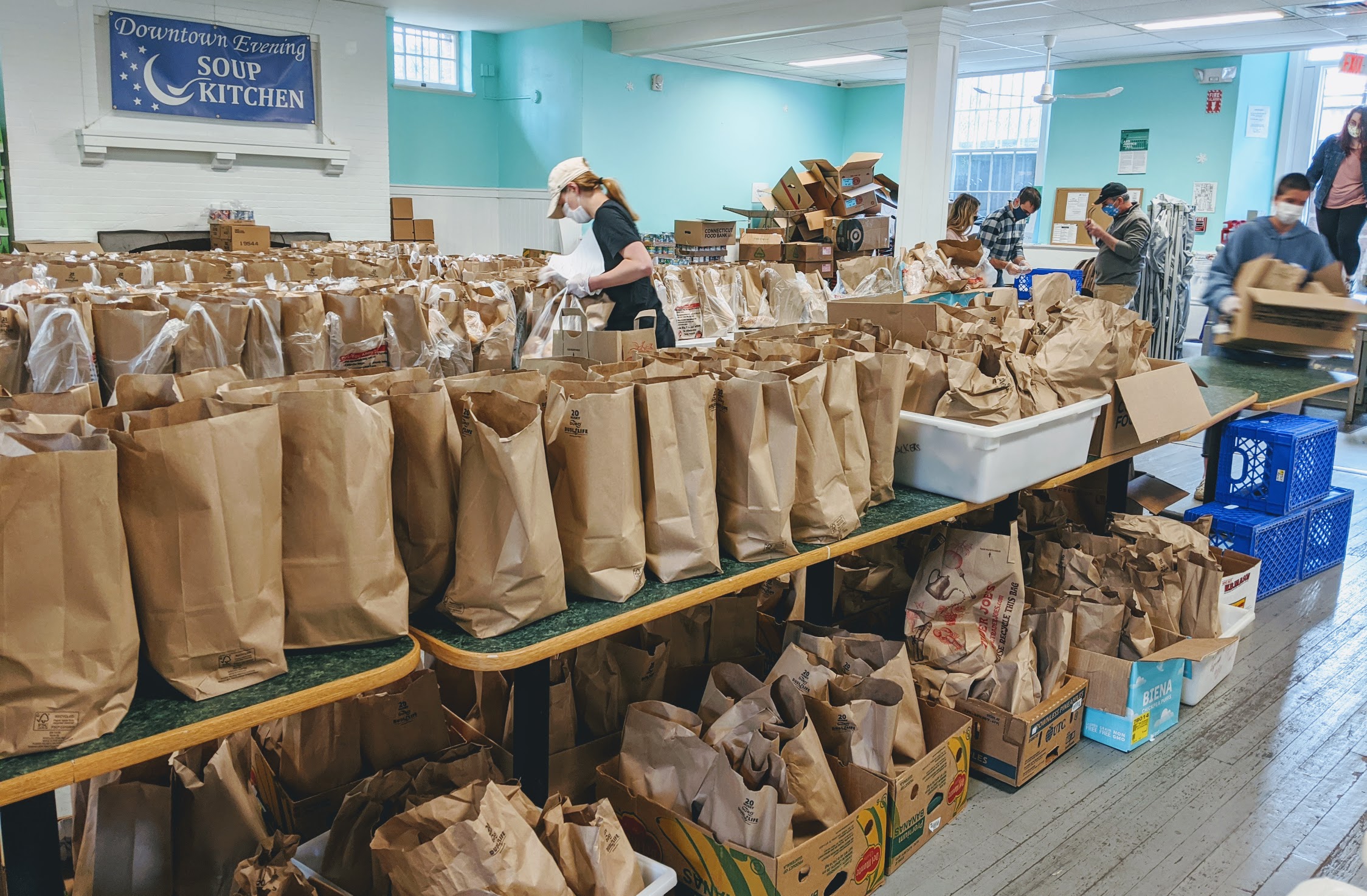Feeding the community: Yale’s partnership with DESK tackling food insecurity
Through initiatives like Kitchen to Kitchen and Yale Community Kitchen, Yale students, faculty and Yale Hospitality work to reduce hunger and food waste in New Haven.

Sylvan Lebrun, Contributing Photographer
Since its founding in 1987, Downtown Evening Soup Kitchen, or DESK, has supported those in poverty or experiencing homelessness in New Haven. For more than 30 of those years, DESK has partnered with Yale Hospitality to support New Haven residents.
In recent years, Yale Hospitality’s partnership with DESK has been possible through the Yale Hunger and Homelessness Action Project, a not-for-profit student organization dedicated to alleviating food and housing insecurity in New Haven. YHHAP serves as an umbrella organization for multiple projects, including Yale Community Kitchen, or YCK, and Kitchen to Kitchen, both of which aim to reduce food waste in the University’s dining halls.
“The prepared foods that DESK and YCK receive from Yale Hospitality frequently include ingredients that we do not have access to through Connecticut Foodshare and other low-cost retailers,” wrote Steve Werlin, the executive director of DESK. “As a result, this partnership enables the distribution of a greater variety of foods.”
Werlin explained that Yale Hospitality supports DESK in three ways. Yale weekly donations of prepared foods to both DESK and YCK. Yale Hospitality also supports DESK’s Thanksgiving for All program by preparing and packaging up to 750 meals to be delivered on Thanksgiving Day. Lastly, Yale Hospitality hosts a big fundraiser for DESK each March, which raised over $100,000 last year.
Werlin further noted that Yale has several programs that provide opportunities for Yale students and faculty to participate in DESK’s efforts. DESK often works with Yale Divinity School and the School of Public Health to place Yale-affiliated individuals in service positions. Students and faculty of the Global Health Justice Partnership, a collaboration between the Yale Law School and School of Public Health, also support DESK’s work.
“We envision that DESK’s future relationship with Yale Hospitality will be to continue to partner so we can, together, provide essential basic needs in the form of prepared meals, and raise critical funds that ensure DESK remains a solvent stalwart in the community,” wrote Werlin.
However, Andrew Landsbergen ’25, one of the three project heads of K2K, explained that there has been a lack of consistent communication from the dining halls. K2K’s main purpose is to pick up food from the various dining halls and deliver it to DESK during the week, from Monday through Thursday. However, according to Landsbergen, since the pick-up and delivery require direct communication with the dining halls and their managers, and there are no established channels of communication between K2K and the different dining hall managers, the delivery process can sometimes be hindered.
Yale Hospitality did not immediately respond with comment.
Landsbergen added that improving communication with dining hall staff is a long-term goal. In the short term, Landsbergen is focused on attracting more volunteers and program leaders, because most of the current project heads are graduating in the upcoming spring.
“We’ve been thinking about expanding to some other hubs, kitchens and the like, and maybe doing runs at different times, but that’s kind of the long-term thing,” said Landsbergen.
In addition to K2K and Yale Hospitality’s efforts, YCK is also a crucial part of Yale’s involvement with DESK.
YCK is a student-run soup kitchen that works with DESK to support the New Haven Community. YCK coordinators and volunteers pick up food from different dining halls, prep the food and serve it, according to Nolyn Mjema ’26, a project head of YCK.
Madeline Pitre ’26, also a project head of YCK, explained that YCK and DESK partner together to serve meals every day of the week and balance the workload between DESK staff and YCK volunteers.
Pitre and Mjema also told the News that they are looking to create a more sustainable funding structure as the amount of guests they serve has expanded.
Since the main source of funding comes from the Yale Undergraduate Organization Funding Committee, which can be inconsistent, Pitre and Mjema explained that they have been looking for other funding opportunities and as of recently have focused their efforts on raising money from the upcoming Yale Student Organizations Annual Raise or SOAR.
SOAR this year will open on Dec. 3 and close on Dec. 10, and anybody from alumni to students and parents can participate.
“Our main goal is to feed as many people as possible,” said Mjema. “So most of the effort goes to week-to-week operations and to make sure we have enough volunteers, enough coordinators, enough supplies to maintain operations” added Pitre, stressing the need for more volunteers.
Students can join YCK by subscribing to their mailing list and can learn more about and join K2K here.







